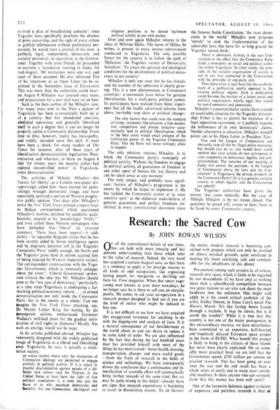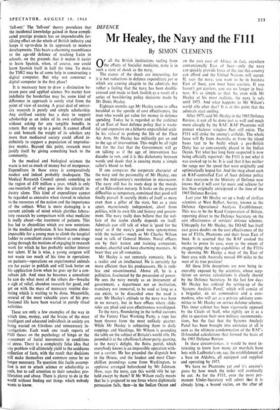Research: the Sacred Cow By JOHN ROWAN WILSON
It is not difficult to see how we have acquired this exaggerated reverence for anything to do with the digging-out and analysis of facts. It is a natural consequence of our bewilderment at the world about us and our desire to reduce it to some kind of order. We are also influenced by the fact that during the last hundred years man has provided himself with most of the things he has most craved—better health, housing, transportation, cheaper and more useful goods —from the fruits of research in the fields of science and technology. We have consequently drawn the conclusion that a continuance and in- tensification of scientific effort will automatically bring further rewards of the same kind. But we may be quite wrong in this belief—already there are signs that research expenditure is beginning to result in diminishing returns. To an increas-
ing extent, modern research is becoming con- cerned with projects which can only be justified on almost mystical grounds, quite unrelated to making life more satisfying, safe and comfort- able for the inhabitants of this planet.
Pre-eminent among such projects is, of course, research into space, which is likely to be regarded by our descendants (if we have any) as nothing more than a schoolboyish competition between two great nations to see who can shoot the most hardware into the unknown. One might well apply to it the sound critical yardstick of the artist, Gulley Jimson, in Joyce Cary's novel The Horse's Mouth. 'It's like farting Annie Laurie through a keyhole. It may be clever, but is it worth the trouble?' While it is true that this country is not one of the major protagonists in this extraordinary exercise, we have nevertheless been committed to an expensive, half-hearted and hopelessly delayed European space project in the form of ELDO. What benefit this project is likely to bring to the citizens of these islands has never been clearly explained. On an osten- sibly more practical level, we are told that the Government spends £250 million per annum on aviation research. This has been going on ever since the war and the end result has been a whole series of costly and in many cases unsale- able machines. Is there anyone who can seriously claim that this money has been well spent?
One of the favourite defences against criticism of expensive and pointless research is that of
`fall-out.' The 'fall-out' theory postulates that the incidental knowledge gained in these compli- cated prestige projects has an imponderable fer- tilising effect on the whole of British industry and keeps it up-to-date in its approach to modern developments. This bears a charming resemblance to the age-old defence of teaching Latin in schools, on the grounds that it makes it easier to learn Spanish, when, of course, one could learn Spanish itself in half the time. To make the TSR2 may be of some help in constructing a digital computer. But why not construct a digital computer in the first place?
It is necessary here to draw a distinction be- tween pure and applied science. No matter how indefinite the borderline may be, some kind of difference in approach is surely vital from the point of view of costing. A great deal of univer- sity research is purely and simply scholarship.
Any civilised society has a duty to support scholarship as an index of its own culture and without asking for any tangible benefits in return. But only up to a point. It cannot afford to sink beneath the weight of its scholars any more than mediaeval society could afford in- definitely to support a population of unproduc- tive monks. Beyond this point, research must justify itself by giving something back to the community.
In the medical and biological sciences the waste is not so much of money but of manpower.
Expenditure in these areas is comparatively modest and indeed probably inadequate. The Medical Research Council spends something in the region of £10 million a year, which is only one-twentieth of what goes into the aircraft in- dustry alone. This kind of expenditure cannot be regarded as excessive when viewed in relation to the resources of the nation and the importance of the subject. What is more damaging is a current attitude of mind which glorifies labora- tory research by comparison with what medicine is really about—the treatment of patients. This has led to absurdities which are now notorious in the medical profession. It has become almost impossible for a young man to climb the hospital ladder to consultant status without at some stage going through the motions of engaging in research work for which he has probably neither interest nor talent. If he is wise, a young surgeon will not waste too much of his time in operations on patients—operations on experimental animals are far easier to publish and will look better on his application form when he goes up for a con- sultant job. And once he becomes a consultant he can do what most of the others do—breathe a sigh of relief, abandon research for good, and get on with the mass of necessary routine doc- toring which is waiting to be done. Meanwhile, several of the most valuable years of his pro- fessional life have been wasted in purely ritual activities.
These are only a few examples of the way in which time, money, and the brains of the most intelligent and educated individuals in society are being wasted on frivolous and unnecessary in- vestigations. Each week one reads reports of PhD theses on the psychology of bingo or the assessment of facial movements in conditions of stress. There is a completely false idea that any problem will ultimately yield to the assiduous collection of facts, with the result that decisions will make themselves and common sense be no longer necessary. To question this facile assump- tion is not to attack science or scholarship as such, but to call attention to their senseless pro- liferation and abuse. There is plenty to do in the world without finding out things which nobody wants to know.































 Previous page
Previous page